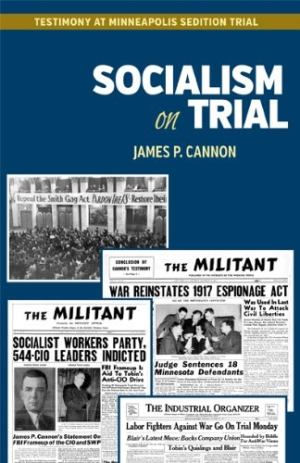Socialism on Trial
Testimony at Minneapolis Sedition Trial
Cannon’s testimony details Marxist philosophy on war and what socialists can take from it to counter the American capitalist majority.
Socialism on Trial, by James P. Cannon, offers explanations to those who question the efficacy of capitalism. This is a new edition of Cannon’s 1941 trial testimony on charges of seeking “to teach, advocate and encourage” revolutionary ideas. Also known as the Smith Act, this trial was the first federal case tried under that law.
At the time, Cannon was National Secretary of the Socialist Workers Party with a thirty-year career as a socialist political activist and defender of workers’ rights. He and twenty-eight others were accused of crimes ranging from “conspiracy to overthrow the government by force and violence” to distributing publications that “advised, counseled and urged” insubordination in the armed forces. During the three-day trial, chief defense counsel Albert Goldman, who was also a defendant in the case, questioned Cannon on the doctrine of the Socialist Workers Party, the differences between Trotsky and Stalin, capitalist violence against social revolution, and protecting workers’ rights.
Although the idea of reading the transcript of a court case may not have the allure of a mystery or thriller, Socialism on Trial does read like a primer on Marxism, socialism, and capitalism that would intrigue academics, historians, those interested in understanding political theory, and those concerned with political activism as seen through the lens of the American justice system. Cannon’s testimony, given only weeks before the United States entered World War II, is an exhaustive look at the impact of capitalism on America’s laborers. Cannon enumerates the reasons why he and the Socialist Workers Party thought that not only would capitalism ultimately fail, but also why President Roosevelt’s New Deal had failed: “But the net result of the whole New Deal experiment was simply the expenditure of billions and billions of dollars to create a fictitious stability, which in the end evaporated. Now the Roosevelt administration is trying to accomplish the same thing by artificial means of the war boom; that is, an armament boom, but again, in our view, this has no possibility of permanent stability at all.”
Along with the testimony, Socialism on Trial includes a new preface by Steve Clark, a critique of Cannon’s testimony by leftist Grandizo Munis, and Cannon’s extensive response to Munis’s critique. The particular beliefs of Cannon reflect early 20th-century socialism in America.
Socialism on Trial is a work written more than half a century ago, but it shows many economic and political similarities to current day America. As economic disparities will always exist, so will the idea of revolution. Cannon knew that it wasn’t simply socialism on trial, but the precious commodity of free speech.
Reviewed by
Monica Carter
Disclosure: This article is not an endorsement, but a review. The publisher of this book provided free copies of the book to have their book reviewed by a professional reviewer. No fee was paid by the publisher for this review. Foreword Reviews only recommends books that we love. Foreword Magazine, Inc. is disclosing this in accordance with the Federal Trade Commission’s 16 CFR, Part 255.

